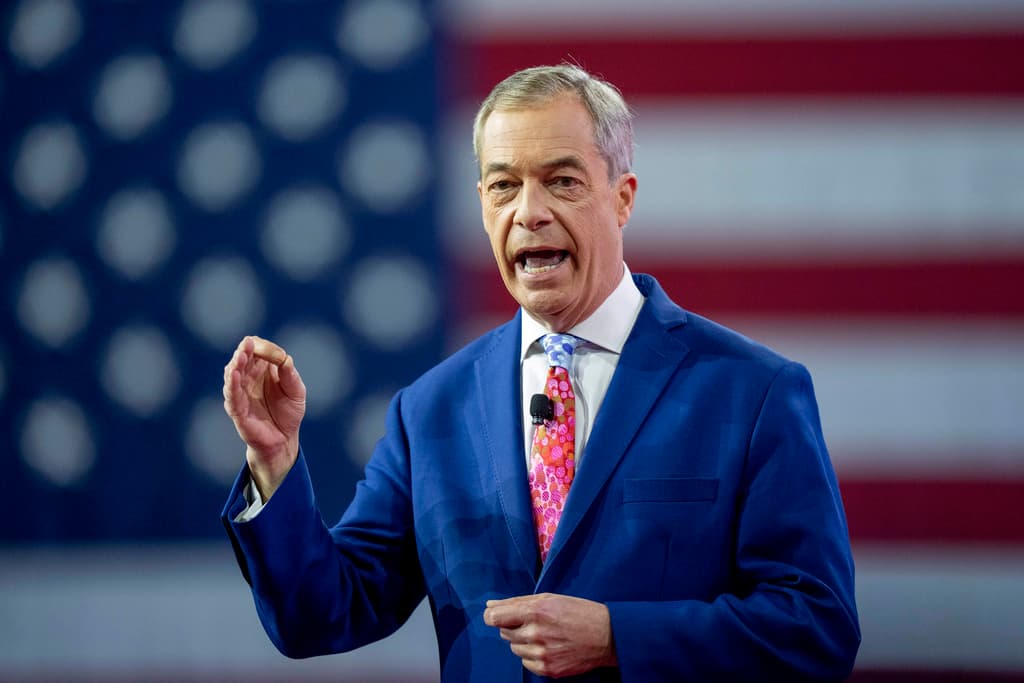As Farage Reverses Course To Stand in Snap Election, Will Reform UK Become New Face of Britain’s Right?
Political obstacles be damned: With Labour’s victory a near-certainty, Reform’s new leader frames his party’s short-term role as the ‘official opposition’ in the new Parliament.

At a hastily called news conference Monday afternoon, Nigel Farage announced he had changed his mind. Yes, he was going to stand at the UK general election, as a Reform candidate for the seat of Clacton. Political obstacles, be damned.
Somewhat overshadowed but no less portentous, Mr. Farage is also taking over as Reform UK leader. Current chief Richard Tice — himself standing for the constituency of Boston and Skegness — graciously stepped aside, to allow the iconic face of the party to lead them into battle.
As has been reported, Mr. Farage admitted last week that he had been planning to seek election all along. He only altered plans when, before he could launch his campaign, Premier Sunak called a snap election for July 4.
Fearing that the window of opportunity was too narrow to canvass successfully, he opted to remain on the sidelines and give an assist to other Reform candidates. What a difference a week can make.
It was while he was out campaigning for colleagues that Mr. Farage was taken aback by the reactions of ordinary voters, who took his decision not to contest the election, personally.
So Sunday afternoon, fully aware of the obstacles before him, Mr. Farage resolved to throw his hat into the ring, after all.
With Labour’s victory at the election a near-certainty, Reform’s new leader sees his party’s short-term role as serving as the “official opposition” in the new Parliament.
Witness the Tories’ internecine warfare since the forced defenestration of Boris Johnson in July 2022. Mr. Farage suggests Conservatives will be more interested in fighting each other for the party leadership than defending ordinary Britons’ against Labour policy.
Reform will serve as the people’s paladin in the House of Commons, against a Labour-Conservative statist duopoly of Tweedledum and Tweedledee.
As for the long-term, Mr. Farage foresees Reform winning more votes overall in 2029, hinting that it will form Government in that Parliament. As it is, he bets that Reform will win more votes than the Conservatives — as opposed to overall seats — this time around.
For now, Reform will fight the election on the issues that won the Brexit referendum in 2016. Border security, lower taxes, and more individual freedom — all issues, Mr. Farage argues, that the Conservatives have betrayed and Labour repudiates.
Following the announcement, Reform’s new leader denied that a vote for Reform is a vote for Labour. The Tories don’t own those votes; he explained to reporters, and besides, their own actions are responsible for plummeting public support.
They are “on the verge of total collapse,” he opined. Instead, Reform’s appeal will bring disaffected former Conservatives out to vote and will garner more than a few Labour votes too, Mr. Farage reckons.
All’s for play, he says, one of the reasons why he changed his mind and decided to run. Out on the campaign trail canvassing for other Reform candidates, Mr. Farage noted a dynamic sea-change, from young and old alike.
The press lobbed the usual “gotcha” questions about his volte-face about not standing. One cheeky reporter even asked if the current Clacton Reform candidate was only now learning that he was not going to be the party’s official standard-bearer.
Responding to the taunt that he was no Margaret Thatcher — who famously declared “the lady’s not for turning” — Mr. Farage replied that he had always been truthful with people, that if conditions favored, he would run; if not, he would devote his energies elsewhere.
Whispered talks with Conservatives also reappeared — the grist of the rumor mill for weeks. Had the Tories approached him about a deal to keep Labour out of office? “No attempt at seduction, not that I’ve noticed,” Mr. Farage answered, to the delight of the audience.
There was even the hypothetical scenario of the unlikely chance that polls were wrong, that the two main parties are more closely aligned than thought, and that in the event of a hung parliament, Reform would be called upon to play “king-maker.”
Now it was Mr. Farage’s turn to laugh. Given that position of influence, Reform would continue to stand with the people, and support whichever party gave the stronger pitch for “no betrayal of Brexit and proper control of our borders.”
All that is for the future, however. For Mr. Farage and Reform, it’s “let’s just fight the campaign for the next four weeks.” Yet no one will deny there are really two campaigns underway.
Oddly enough, the battle to form the next UK Government is ancillary to what may be the more interesting contest: whether Reform beats out the Conservatives to be the new face of the British right.

